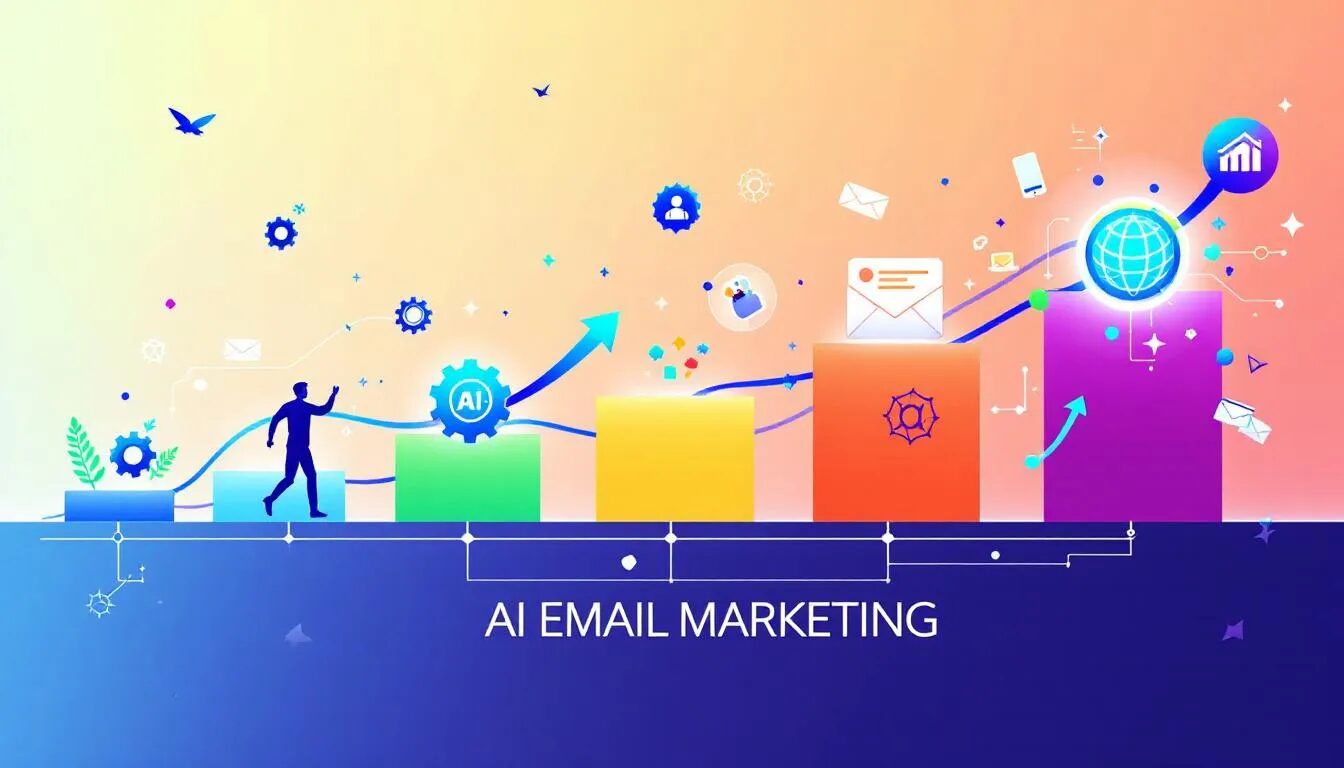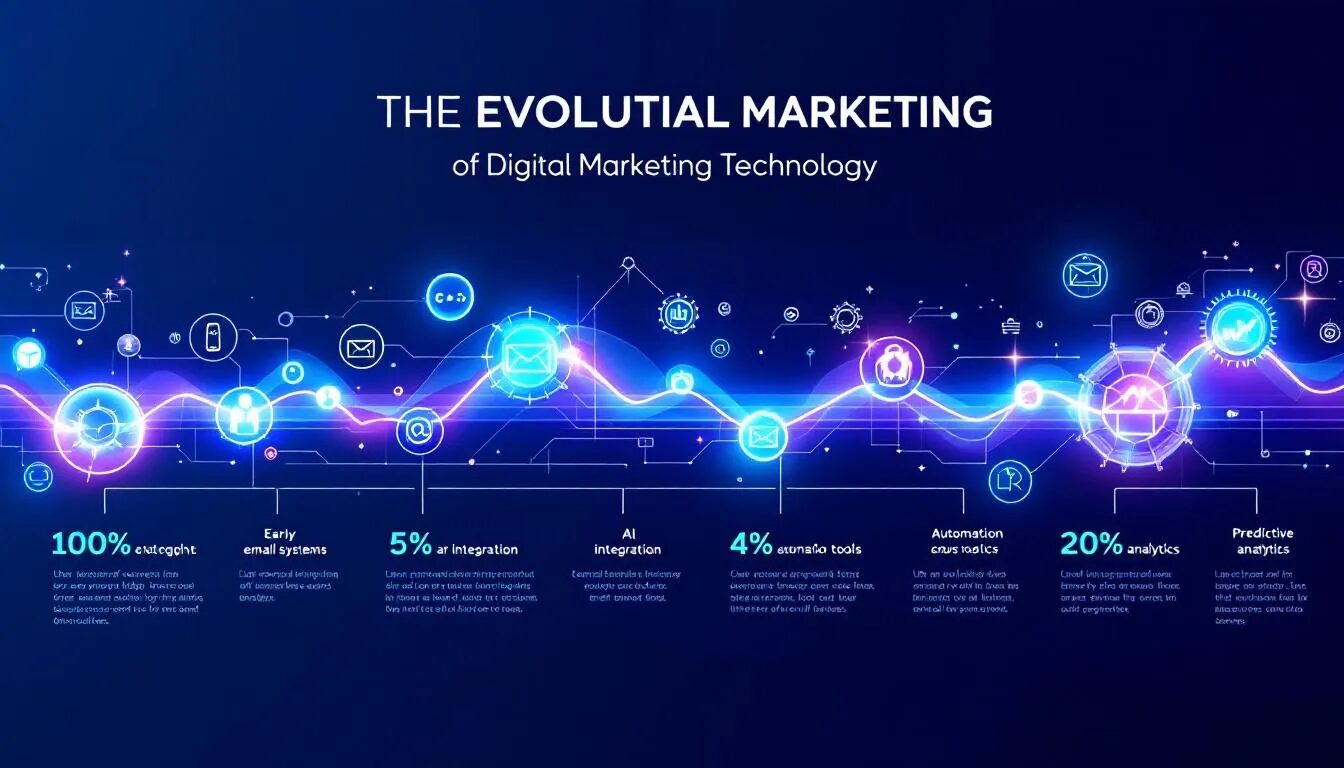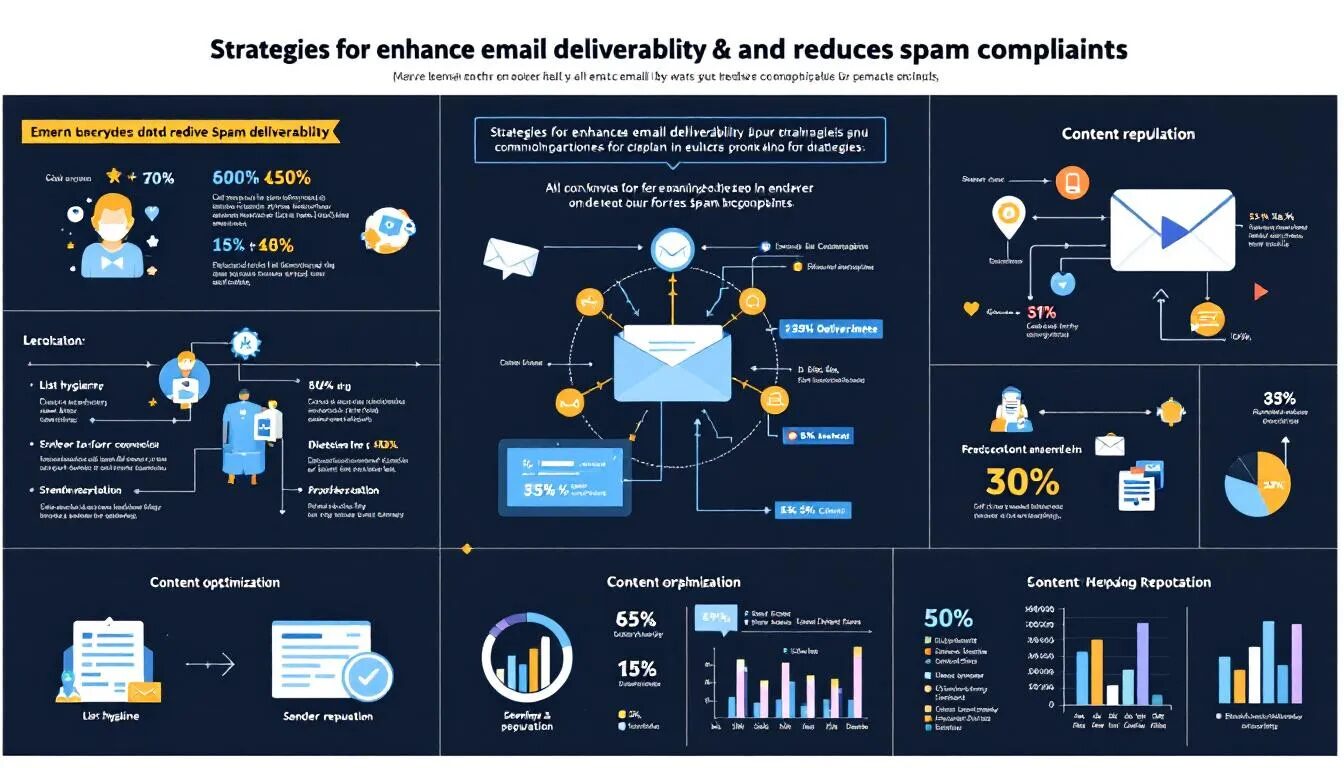
Top Strategies for Email Marketing AI Personalization
How can AI enhance your email marketing? Email marketing AI personalization leverages artificial intelligence to tailor campaigns to individual recipients. This boosts engagement and conversions. In this article, learn the benefits, features, and strategies for implementing AI in your email marketing.
Key Takeaways
- AI personalization in email marketing enhances user engagement by tailoring content based on individual customer data, leading to higher open rates and conversions.
- Key features of AI-powered tools include behavioral analysis, segmentation, and dynamic content creation, significantly improving the effectiveness of email campaigns.
- Future trends in AI email personalization are focused on hyper-personalization, voice-activated marketing, and enhanced deliverability to meet evolving consumer expectations.
Understanding AI Personalization in Email Marketing

To appreciate the impact of AI personalization in email marketing, one must understand what it entails. AI personalization uses artificial intelligence to craft highly tailored, data-driven email campaigns. These resonate deeply with recipients, making them feel valued and understood. Analyzing customer data, such as browsing behavior and purchase history, allows AI to customize email content to match individual preferences and behaviors.
AI personalization offers profound benefits:
- AI-driven tools streamline campaigns
- Reduce the need for mass email blasts
- Significantly boost revenue
- Personalized communications build trust
- Capture attention
- Engage recipients more effectively with ai powered features
What is AI Personalization?
AI personalization in email marketing is all about creating highly relevant and engaging email content tailored to each recipient. AI tools analyze individual recipient data and behaviors to tailor messages that resonate on a personal level. For example, Netflix customizes email communications based on individual viewing preferences, ensuring each message is highly relevant. This approach helps businesses to generate personalized emails effectively.
Generative AI plays a significant role in this process. It assists marketers in quickly creating customized email content that reflects customer behavior and preferences. Integrating AI allows businesses to tailor emails based on comprehensive customer data, making each communication more engaging and relevant.
Benefits of AI Personalization
The benefits of AI personalization in email marketing are numerous:
- AI analyzes customer behavior and automates content creation, leading to improved open rates and higher engagement.
- Tailoring content to specific segments increases relevance, fostering a deeper connection with the audience.
- Personalized emails enhance relevance, thereby improving engagement and driving conversion rates.
Additionally, personalized email marketing yields a significant return on investment, averaging an ROI of $42 for every dollar spent. Delivering personalized content enhances the customer experience, allowing AI-driven tools to uncover valuable insights and boost overall campaign performance.
Key Features of AI-Powered Email Marketing Tools
AI-powered email marketing tools offer features that enhance personalization and campaign effectiveness, including:
- Analyzing user behavior
- Segmenting audiences to create targeted email campaigns
- Using machine learning algorithms to improve campaign effectiveness by continuously learning and adapting to new data.
One of the most significant advancements is the use of generative AI to create highly relevant messages tailored to specific consumer microcommunities. These features enable email marketers to deliver highly personalized and engaging content, transforming email marketing strategies.
AI-Driven Segmentation
AI-driven segmentation involves:
- Categorizing audiences by analyzing customer interactions and preferences.
- Rapidly segmenting customers based on interaction history and preferences.
- Enabling more targeted and relevant email marketing campaigns and to create segments for better audience segmentation engagement.
Using AI tools, marketers can sift through large volumes of customer data to uncover trends and patterns that inform their digital marketing strategies. This ensures each segment receives content tailored to their specific needs and preferences.
Personalized Content Creation
AI has revolutionized email marketing by enabling the creation of highly personalized campaigns that enhance user engagement. Natural Language Processing (NLP) technology allows AI to formulate more natural, engaging content, making each message more relatable.
Analyzing customer behavior and preferences allows AI to create tailored email content that resonates with individual users. For instance, Amazon uses browsing and purchase history, along with behavioral data, to send relevant product suggestions, illustrating the power of data analysis in creating personalized emails.
Predictive Analytics
Predictive analytics tools and AI contribute to email marketing by:
- Forecasting customer actions, enabling timely and relevant communications.
- Identifying patterns and trends in customer data, informing the creation of targeted email content.
- Increasing transaction rates through personalized emails, with some reports indicating a six-fold increase compared to standard emails.
This method allows marketers to craft emails that align with customer behavior and preferences, increasing engagement and driving conversions. Predictive analytics significantly enhances the personalization capabilities of AI in email marketing.
Implementing AI for Email Personalization

Incorporating AI into your email marketing strategy enables highly tailored experiences for each recipient. AI offers opportunities in:
- Data analysis
- Segmentation
- Content personalization
- Automation Leveraging these capabilities allows marketers to optimize campaigns and deliver more relevant content to their audiences.
Effective implementation of AI for email personalization requires enhancing the technology stack and leveraging improved analytics. The following subsections guide you through analyzing customer data, creating dynamic content, and automating personalized campaigns.
Analyzing Customer Data
Analyzing customer data is the first step in implementing AI for email personalization. AI platforms optimize email marketing strategies by:
- Saving time
- Accelerating creative processes
- Generating leads
- Closing sales
- Extracting valuable customer insights
Analyzing demographics, purchase history, and historical data engagement levels helps to analyze customer data for customer segmentation, consolidating data into a single view for quicker identification of loyal customers.
AI algorithms identify patterns and trends in customer data, enabling targeted email content that aligns with customer behavior and preferences. Post-campaign analysis by AI provides actionable insights to optimize future email marketing efforts.
Creating Dynamic Content
Create dynamic content is crucial for personalized email marketing. AI can help by:
- Dynamically generating personalized subject lines and email content
- Providing tailored product recommendations to boost engagement
- Quickly generating content variations to allow marketers to test different approaches effortlessly.
Human oversight ensures AI-generated content maintains brand voice and accuracy. AI streamlines customer journey mapping for effective marketing automation, making the process more efficient.
Automating Personalized Campaigns
AI-driven automation allows marketers to respond to customer behaviors in real-time, ensuring timely and relevant communications. Using AI reduces time spent on repetitive tasks, allowing marketers to focus more on strategy and creativity.
AI tools create workflows that trigger emails based on specific customer actions. For example, Encharge automates email personalization based on user actions, enhancing engagement and driving conversions with ai technology. Additionally, abandoned cart reminders can be utilized to recover lost sales using ai powered tools and ai automation.
Best Practices for AI-Personalized Emails
Maximizing the benefits of AI-personalized emails requires following best practices. AI can:
- Enhance subject lines
- Optimize send times
- Segment audiences
- Automate workflows
Combining AI tools with human input significantly enhances customer engagement in email marketing.
Ethical application of AI in email marketing involves using customer data transparently and respectfully. Balancing innovation with ethical responsibilities is necessary to maintain brand consistency and authenticity.
Crafting Effective Subject Lines
Effective subject lines are crucial for successful email marketing campaigns. AI enhances email subject lines by generating diverse options that better resonate with recipients’ preferences. For instance, Amazon’s personalized emails achieve a 35% higher open rate compared to non-personalized emails, highlighting the importance of compelling write email subject lines.
Generative AI revolutionizes content generation for targeted marketing emails by suggesting compelling subject lines. AI tools like Brevo offer AI-driven subject line optimization, ensuring higher relevancy to recipients and improving open rates.
Optimizing Send Times
Optimizing send times is another best practice for AI-personalized emails. AI predicts the best send times based on subscriber behavior through predictive sending. Tools like Seventh Sense and Encharge use AI to optimize email delivery timings, increasing the likelihood of opens and engagement.
Implementing AI suggestions for send time optimization leads to more timely and personalized messaging, ensuring emails reach recipients when they are most likely to engage. Optimized send times are a simple yet effective way to enhance email campaign performance.
Continuous A/B Testing
Continuous A/B testing is crucial for understanding the effectiveness of various email strategies. AI technologies facilitate continual refinement through effective analysis of A/B test results. Regular A/B testing helps marketers identify the most engaging email content and optimize their campaigns.
A/B testing allows marketers to experiment with different subject lines, send times, and content variations to determine what resonates best with their audience. This ongoing process ensures continuous improvement and optimal results for email campaigns.
Top AI Email Marketing Tools in 2025

In 2025, several AI email marketing tools and email personalization tools stand out for enhancing personalization and campaign effectiveness. These tools include Encharge, ActiveCampaign, and Brevo, each offering unique features and benefits. Leveraging these tools allows marketers to suggest optimal send times, draft and send entire email campaigns, and automate personalization based on customer data through email marketing automation.
The best AI email marketing tools save time and deliver better results, enhancing overall campaign performance. For example, GetResponse uses AI to write emails faster, group audiences smarter, and find the best send times.
Shopify Magic generates marketing copy and images using store data, enhancing email marketing efficiency.
Encharge
Encharge’s core functionality is built around AI, enhancing email personalization by adapting to user behaviors. Encharge automatically sends emails at optimal times, ensuring timely and relevant communication. Its AI email subject line generator creates engaging, professional-quality subject lines.
The platform automates behavior-based emails, reducing inefficiencies of standard tools that use a one-size-fits-all approach. By closely monitoring user behaviors within the app, Encharge enhances personalization and drives more relevant communications.
It primarily serves SaaS companies, addressing their specific needs for personalized marketing strategies.
ActiveCampaign
ActiveCampaign excels in sending emails, tracking leads, and maintaining audience engagement. Its AI capabilities include lead scoring, customer journey mapping, and personalized email content. ActiveCampaign uses AI to determine optimal send times, predict buyer readiness, and assist in writing emails.
This platform suits businesses needing detailed automations to manage a growing customer base. ActiveCampaign’s paid plan starts at $15 a month, with pricing increasing as more advanced features are unlocked.
Brevo
Brevo, formerly Sendinblue, is an email marketing platform designed for small businesses seeking affordable marketing solutions. Brevo’s AI features are available with the Business tier, with paid plans starting at $9 a month.
The platform integrates multi-channel messaging capabilities for a cohesive marketing strategy and helps optimize elements like subject lines and send times. Brevo’s affordability and comprehensive features make it an excellent choice for small businesses aiming to enhance their email marketing efforts.
Case Studies: AI Personalization Success Stories
Real-world examples showcase how businesses leverage AI to enhance personal communication in email marketing. These case studies highlight the success of AI personalization in driving engagement, loyalty, and revenue. Personalized emails based on individual purchase history lead to increased customer engagement and loyalty.
We will explore how industry giants like Amazon, Spotify, and Netflix use AI to create personalized email campaigns that resonate with their audiences. These success stories demonstrate the power of AI personalization in transforming email marketing strategies.
Amazon
Amazon leverages AI and customer data to create tailored email marketing strategies that include targeted product recommendations. By utilizing advanced AI algorithms, Amazon personalizes email recommendations to enhance user engagement and drive sales.
Amazon’s recommendation engine is a significant contributor to revenue, accounting for approximately 35% of its total sales. This success story illustrates how AI personalization can significantly impact a company’s bottom line.
Spotify
Spotify creates personalized playlists and tailored email recommendations based on user listening habits. The platform utilizes AI to curate playlists, which are then featured in personalized email updates sent to users. This approach has been beneficial for Spotify. It has contributed to building strong customer loyalty and increasing engagement.
By analyzing user listening habits, Spotify can create highly relevant content that resonates with its audience, showcasing the power of AI in personalized email marketing.
Netflix
Netflix personalizes email content and recommendations based on viewing history. By analyzing viewing history and preferences, Netflix tailors its email communications to align with individual user interests. This personalized approach has resulted in higher retention rates and increased customer satisfaction.
Netflix’s success story demonstrates the effectiveness of AI personalization in creating engaging and relevant email content that keeps the entire audience coming back for more.
Challenges and Ethical Considerations
While AI personalization offers numerous benefits, it also presents challenges and ethical considerations that marketers must address. One significant limitation is that AI often lacks the human touch necessary for a personable brand voice. To overcome this, marketers must integrate ai balance automation with human oversight to ensure brand consistency and authenticity.
Ethical considerations include ensuring data privacy and avoiding bias in AI algorithms. Marketers must use customer data transparently and comply with regulations such as GDPR and CCPA to maintain customer trust.
Addressing these challenges is crucial for the successful implementation of AI in email marketing.
Privacy Concerns
Privacy concerns are paramount when using AI in email marketing. Bulk senders must prove their identity and maintain compliance when sending over 5,000 messages within a 24-hour period to adhere to Google’s policies. Implementing privacy measures, such as the Einstein Trust Layer, is essential for ensuring data privacy and security in AI-driven email marketing.
Compliance with regulations such as GDPR and CCPA is crucial for maintaining customer trust in email marketing practices. Neglecting privacy concerns can lead to legal repercussions, loss of customer trust, and damage to brand reputation.
Avoiding Bias
Bias in AI algorithms can lead to unfair personalization, impacting the effectiveness of email marketing campaigns. Ensuring privacy and fairness in AI personalization helps foster trust and improves the overall customer experience. To prevent biases from skewing AI-driven personalization, a balance between automation and human touch is essential.
Marketers must regularly audit their AI models to identify and mitigate biases, ensuring that their email marketing strategies are fair and inclusive.
Balancing Automation and Human Touch
Balancing automation and human touch is crucial for effective AI personalization in email marketing. While AI can handle repetitive tasks and data analysis, manual effort is necessary to ensure that the AI-generated content maintains brand voice and accuracy.
To avoid mistakes and biased language, it is crucial to have a human review AI-generated email content. This balance ensures that email marketing campaigns are both efficient and personable, enhancing the overall customer experience.
Future Trends in AI Email Personalization
Emerging trends in AI email personalization include:
- Hyper-personalization
- Natural language processing
- Voice-activated marketing
- Enhanced deliverability
These trends are shaping the future of email marketing by providing more tailored and engaging experiences for recipients.
As consumer expectations evolve, marketers are pivoting towards hyper-personalization, using real-time data to create extremely tailored email experiences. Natural language processing will enable AI to better understand and generate human-like text, improving the personalization of email content.
Hyper-Personalization
Hyper-personalization in email marketing is driven by real-time data, allowing for immediate and relevant customer engagement. By providing content tailored to user behavior, hyper-personalization enhances customer engagement and meets the growing demand for individualized marketing approaches.
As consumer expectations continue to evolve, marketers must embrace hyper-personalization to create deeper connections with their audiences. This approach ensures that each email is highly relevant and engaging, driving higher conversion rates and customer satisfaction, which ultimately helps to retain customers and personalize messages. By understanding customer journeys, brands can tailor their strategies even more effectively to personalize emails.
Voice-Activated Email Marketing
Voice-activated email marketing tools engage users by reading emails aloud through AI-powered voice assistants. This innovative approach ensures a seamless and personalized experience for users, making email interactions more engaging and accessible.
Optimizing emails for voice interactions is a key trend that will enhance user experience and drive engagement. As voice-activated technology continues to evolve, marketers must adapt their email strategy to incorporate this new form of interaction.
Enhanced Deliverability
Enhanced deliverability is another future trend in AI email personalization. AI improves email deliverability by analyzing sender reputation, content, and recipient behavior. AI tools are becoming essential for tracking and boosting sender reputation, which directly influences email deliverability rates.
To maximize inbox placement, marketers must adhere to industry standards like DMARC and ensure their email content is engaging and relevant. Enhanced deliverability ensures that emails reach their intended recipients, driving higher engagement and conversions.
Summary
In summary, AI personalization in email marketing offers numerous benefits, including increased engagement, higher conversion rates, and improved customer experience. By leveraging AI-driven tools, marketers can create highly personalized email campaigns that resonate with their audiences. Key strategies include analyzing customer data, creating dynamic content, and automating personalized campaigns.
As we look to the future, trends like hyper-personalization, voice-activated email marketing, and enhanced deliverability will continue to shape the email marketing landscape. By embracing these trends and addressing challenges like privacy concerns and bias, marketers can harness the full potential of AI personalization. Let’s take these insights and transform our email marketing strategies for greater success.
Frequently Asked Questions
What is AI personalization in email marketing?
AI personalization in email marketing means using artificial intelligence to tailor your emails specifically for each recipient by analyzing their data and behaviors. This approach boosts engagement by ensuring your content aligns with individual preferences.
How can AI personalization benefit my email marketing strategy?
AI personalization can really boost your email marketing by increasing open rates and engagement, all while creating a stronger connection with your audience. By tailoring content to fit their preferences, you’re not just selling—you’re building relationships that can lead to higher conversion rates.
What are some key features of AI-powered email marketing tools?
AI-powered email marketing tools excel in features like AI-driven segmentation, personalized content creation, and predictive analytics. These elements help you craft highly targeted and effective email campaigns that truly resonate with your audience.
How can I implement AI for email personalization?
To effectively implement AI for email personalization, focus on analyzing customer data to spot trends, and then create dynamic content tailored to each user. Don’t forget to automate these personalized campaigns and continuously optimize your strategies for the best results.
What are some future trends in AI email personalization?
The future of AI email personalization is all about hyper-personalization and voice-activated marketing, which will create highly tailored experiences. By leveraging real-time data, businesses can enhance engagement and improve conversions like never before.
Want More Tips?
Looking for Check out our latest guides and resources to elevate your marketing game
© 2025, Vertical Response. All rights reserved.



